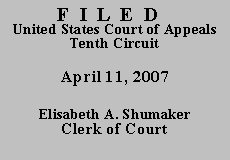

UNITED STATES OF AMERICA,
PlaintiffAppellee,
v.
DARNELL JAMAR NASH,
DefendantAppellant.
Before McKAY, BRISCOE, and
McCONNELL, Circuit Judges.
In this pro se 28 U.S.C. § 2255 prisoner appeal, Defendant contends
that
he received ineffective assistance of counsel regarding his plea agreement as well
as at sentencing and on appeal, that the district court erroneously accepted his
plea in violation of Rule 11 of the Federal Rules of Criminal Procedure, and that
the district court improperly addressed Defendant's objections in violation of
former provisions of Rule 32 of the Federal Rules of Criminal Procedure.
His conviction was affirmed on direct appeal by a panel of this court in United States v. Nash, 120 Fed. App'x 770 (10th Cir. 2005) (unpublished), which addressed the consequence of the appellate waiver in his plea agreement as well as the level of effective counsel that led to his knowing and voluntary plea. The district court, relying predominately on statements made in that opinion and on the consequences of the appellate waiver provision, determined that Defendant was not entitled to relief on any of his claims and denied his § 2255 petition and his request for a certificate of appealability ("COA").
Although Defendant has not filed a formal COA application, we treat his notice of appeal as such. See Fed. R. App. P. 22(b)(2). To obtain a certificate of appealability, Petitioner must make a "substantial showing of the denial of a constitutional right." 28 U.S.C. § 2253(c)(2). In order to meet this burden, Petitioner must demonstrate "that reasonable jurists could debate whether (or, for that matter, agree that) the petition should have been resolved in a different manner or that the issues presented were adequate to deserve encouragement to proceed further." Slack v. McDaniel, 529 U.S. 473, 484 (2000) (quotation omitted).
As an initial matter, we note that the panel on direct appeal concluded that Defendant knowingly and voluntarily entered into the plea agreement. Accordingly, Defendant's Rule 11 challenge is denied, as is his claim of ineffective assistance of counsel based on the alleged failure of defense counsel to adequately advise Defendant as to the plea agreement. See United States v. Nolan, 571 F.2d 528, 530 (10th Cir. 1978) (noting that an issue disposed of on direct appeal will not be reconsidered on a collateral attack pursuant to § 2255 absent an intervening change in the law of the circuit). Also, Defendant never raised his Rule 32 contention on direct appeal. "[T]he failure by a defendant to raise a nonconstitutional issue on direct appeal when he was able to do so ordinarily will bar collateral review of that issue under Section 2255." United States v. Gattas, 862 F.2d 1432, 1435 (10th Cir. 1988). Defendant has failed to overcome this bar. See United States v. Tranakos, 968 F.2d 1225 (10th Cir. 1992) (table). To the extent Defendant's Rule 32 argument is predicated on having received ineffective assistance of counsel at sentencing, we observe that defense counsel at sentencing objected to certain factual assertions contained in the pre-sentence report, but those objections were overruled. Defendant has not established that counsel's performance "fell below an objective standard of reasonableness" or that his sentence would have been different were it not for the alleged ineffectiveness. Strickland v. Washington, 466 U.S. 668, 688, 694 (1984). Finally, Defendant's contention that he received ineffective assistance of counsel on direct appeal is without merit. See United States v. Martinez-Lomeli, 86 F.3d 1167 (10th Cir. 1996) (table) ("The mere filing of an Anders Brief cannot form the basis for a claim of ineffective assistance of counsel and has no bearing on the relief being sought by [Defendant] on this direct appeal--relief from the sentence imposed by the district court."). We agree with the district court's conclusion regarding the lack of meritorious issues and, therefore, with its conclusion that the Strickland test has not been satisfied.
A careful review of Defendant's brief, the district court's disposition, and the record on appeal, reveals nothing raising an issue that meets our standard for the grant of a certificate of appealability. Accordingly, we DENY Defendant's request for a certificate of appealability and DISMISS the appeal.
Entered for the Court
Monroe G. McKay Circuit Judge
*. This order is not binding precedent, except under the doctrines of law of the case, res judicata, and collateral estoppel. It may be cited, however, for its persuasive value consistent with Fed. R. App. P. 32.1 and 10th Cir. R. 32.1.